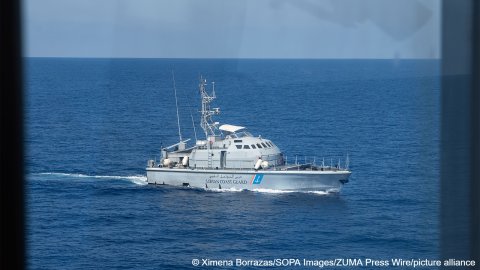Greece Trains Libyan Coast Guard to Enhance Migration Control
The Mediterranean region has long been a focal point for migration, with various countries grappling with the complexities of immigration control. One significant development in this ongoing narrative is Greece’s initiative to train the Libyan Coast Guard. This training is aimed at enhancing the capabilities of Libyan officials in managing migration effectively.
Background on Migration Challenges
Migration across the Mediterranean is not just a regional issue; it has global implications. Greece, due to its geographical location, serves as a major entry point for many migrants seeking asylum in Europe. The Libyan Coast Guard’s role is crucial as it operates in one of the primary departure points for migrants attempting perilous journeys across the sea.
Objectives of the Training Program
The training program initiated by Greece aims to achieve several key objectives:
- Strengthening Operations: By enhancing the operational skills of the Libyan Coast Guard, Greece intends to bolster their ability to conduct search and rescue missions effectively.
- Improving Interception Capabilities: Trained officials will be better equipped to intercept vessels used by smugglers, thus reducing the number of migrants attempting to cross the Mediterranean unassisted.
- Fostering Cooperation: This initiative encourages collaboration between Greece and Libya, paving the way for shared strategies in managing migration.
International Reactions and Concerns
While the initiative has been framed as a step towards enhanced migration control, there are several concerns raised by international organizations and human rights advocates. Critics argue that strengthening the Libyan Coast Guard could lead to increased human rights violations against migrants. Reports suggest that many migrants face dire conditions in Libya, and there is skepticism about the treatment they may receive if intercepted by a more fortified coast guard.
Moreover, the implications of such training extend beyond just migration control; they touch on issues of sovereignty, human rights, and international law. As Greece and Libya navigate these murky waters, it is paramount that the training program adheres to international standards to ensure the humane treatment of migrants.
The Role of International Organizations
International organizations like the United Nations and various NGOs play a significant role in monitoring the situation. Their involvement is critical in ensuring that migration policies are aligned with humanitarian standards. These organizations often advocate for humane treatment and seek to provide assistance to migrants who find themselves in precarious situations.
In the context of this training initiative, international bodies may push for:
- Accountability: Ensuring that Libyan authorities are held accountable for their actions regarding migrants.
- Support for Asylum Seekers: Advocate for policies that protect the rights of those seeking asylum, rather than merely focusing on border control.
- Collaboration: Facilitate cooperation between nations to create a more comprehensive approach to migration that addresses root causes and humanitarian needs.
Looking Ahead: The Future of Migration in the Mediterranean
The ongoing training of the Libyan Coast Guard is just one piece of a much larger puzzle concerning migration in the Mediterranean. As nations grapple with their immigration policies, the importance of a balanced approach cannot be overstated.
Efforts to control migration must not come at the expense of human rights. As Greece moves forward with this initiative, it must consider the broader implications of its actions on the lives of those seeking refuge and safety.
In light of recent shifts in immigration policy across various nations, including the U.S. and European countries, it remains crucial for all stakeholders to engage in meaningful dialogue. This dialogue should focus on shared responsibilities and the need for comprehensive immigration reform that respects the dignity of all individuals.
Conclusion
Greece’s training of the Libyan Coast Guard represents a critical step in addressing migration challenges in the Mediterranean. However, it is essential for this initiative to be executed with a strong emphasis on human rights and humanitarian principles. As migration continues to shape the geopolitical landscape, countries must work together to foster solutions that prioritize safety and dignity for all migrants.
In an era where the conversation around immigration is becoming increasingly polarized, initiatives like these have the potential to either exacerbate tensions or pave the way for innovative solutions. It is imperative that nations remain vigilant and committed to creating a just and humane approach to migration.










